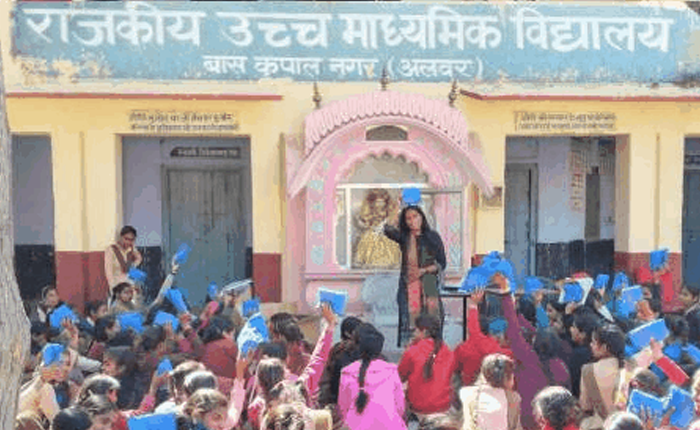Havells understands that WASH (Water, Health and Hygiene) are critical for ensuring overall development of children and their families. Focus on WASH program in schools stems from our efforts to realize our vision of a world where all children go to school that provides safe, healthy and comfortable environment where they grow, learn and thrive. Schools also are powerful agents of change for enabling and encouraging changes in the society as well.
We decided to take the first step from Alwar where we are already running our flagship program of mid- day meal. A research was done to understand the present situation and few of the observations were:
• Only 70% of the students used toilets that were available in all schools
• In most schools toilets were clogged with mud and fecal matter
• Water was not available in the toilets to flush waste or for personal hygiene.
• Adolescent girls were found to be absent during menstruation as the toilet was unfit for use. A similar situation was seen when children would prefer to stay back home rather than attend school on days when they had dysentery.
Keeping these issues in mind, Havells initiated a sanitation drive in 2014 in government schools of Alwar district wherein the company built eco-friendly bio-toilets. These eco-friendly bio-toilets use special bacteria developed by DRDO (Defence Research & Development Organisation) to convert human waste into biogas and water. The water can be used for gardening, cleaning or ground water recharge. Havells has built over 4000 bio-toilets in 400 government schools in Alwar district of Rajasthan. This initiative of Havells amalgamates perfectly with the ambitious ‘Swachh Bharat Mission’ advocated by the Government of India and dovetails with United Nations Sustainable Development Goal No-3 & 6.




Sensitization towards behavior change
The next step in this direction was to sensitize students as well as the teachers about the importance of WASH. We invested in behavioral change sensitization workshops not only for the children but also for the school teachers who could further educate parents and the public at large about the importance of Sanitation, cleanliness and hygiene in particular.
The implementation of behavior change workshops aims to develop good hygiene habits amongst children from tender age. Activities like songs, wall paintings, rhymes, quizzes, painting competitions help children understand concepts better and are able to explain to their parents and bring positive change in the family. Teachers are also being involved in the process who in turn could educate parents and society at large.
We did not stop at building toilets or working on behavior change of children and teachers but went a step further. While toilets are built but their upkeep was a major issue due to paucity of funds at the school level. We decided to contribute equal amount of money as given by the government to ensure these toilets are kept neat and clean and students use them regularly. A strict vigil on upkeep of these toilets ensures the funds are used properly.
Another problem realized was the one faced by adolescent girls and could not be ignored was high absenteeism from school and wrong myths about menstruation which hampered their health and education.
To let them be away from this issue Havells joined hands with Project Baala wherein the young rural girls are educated by spreading awareness about menstruation in rural schools & providing eco-friendly sanitary napkins to them. The pad is made of three layers of cloth stitched together, is reusable and can be used for a period of 1.5 to 2 years. The project is the brainchild of one of the two young women who visit different villages across India to conduct awareness workshops in schools and distribute a kit of 3 pads to every participant.
To begin, a kit of these 3 sanitary pads was given to 1165 girls of 3 government schools of Alwar district. As on date, 3 Lakh+ Sanitary Pads distributed to adolescent girls in 500+ Schools alongwith sanitation drive at Alwar & across India. With these small steps, we take a 360 degree approach to this major problem of sanitation.
All these initiatives helped improve attendance, health and cognitive development, increased girls’ participation, established positive hygiene behavior and offers the opportunity to introduce better WASH practices in families and communities and addresses issues of inequity and exclusion
